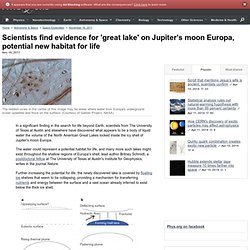

203: Europa. Europa´s Churn Leads to Oxygen Burn. There may be enough oxygen in the waters of Jupiter's moon Europa to support millions of tons worth of fish, according to a new study.

While no one is suggesting there are fish on Europa, this finding suggests the Jovian satellite could be capable of supporting the kinds of life familiar to us here on Earth. Europa, which is roughly the size of Earth's moon, is enveloped by a global ocean about 100 miles deep (160 km), with an icy crust that may be only a few miles thick. From what we know of Earth, where there is water, there is a chance at life, so for many years scientists have speculated that this Jovian moon could support extraterrestrials. As we learned more about Jupiter’s effect on its moons, the possibility for life on Europa grew even more likely. Studies showed the moon could have enough oxygen to support the kind of life we are most familiar with on Earth. Other mechanisms could help stir Europa's crust also. Greenberg detailed his findings May 6 in the journal Astrobiology. Voyager Image Gallery: Voyager at Jupiter. Galileo Legacy Site. Hunting for Fossils on Europa. If extraterrestrial life exists on Jupiter's moon Europa, instead of deploying probes to drill past its ice shell to look for aliens in the ocean below, one might just go fossil-hunting on the icy surface.

"A prospector sent there could possibly find extraterrestrial life within our lifetimes," suggested planetary scientist Richard Greenberg at the University of Arizona's Lunar and Planetary Laboratory at Tucson. Europa, which is roughly the size of Earth's moon, is enveloped by a global ocean that may be about 100 miles deep (160 km). This ocean is overlain by an icy crust of unknown thickness, although some estimates are that it could be only a few miles thick.
Since wherever there is water on Earth there is a chance of life, for many years scientists have entertained the notion that this Jovian moon could support extraterrestrials. This process creates the "chaotic terrain" that comprises roughly 40 percent of the ice shell, and also sends matter both upward and downward.
Scientists find evidence for 'great lake' on Jupiter's moon Europa, potential new habitat for life. In a significant finding in the search for life beyond Earth, scientists from The University of Texas at Austin and elsewhere have discovered what appears to be a body of liquid water the volume of the North American Great Lakes locked inside the icy shell of Jupiter's moon Europa.

The water could represent a potential habitat for life, and many more such lakes might exist throughout the shallow regions of Europa's shell, lead author Britney Schmidt, a postdoctoral fellow at The University of Texas at Austin's Institute for Geophysics, writes in the journal Nature. Further increasing the potential for life, the newly discovered lake is covered by floating ice shelves that seem to be collapsing, providing a mechanism for transferring nutrients and energy between the surface and a vast ocean already inferred to exist below the thick ice shell. The scientists focused on Galileo spacecraft images of two roughly circular, bumpy features on Europa's surface called chaos terrains.